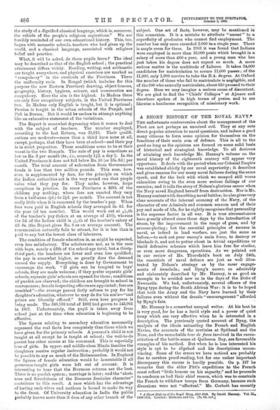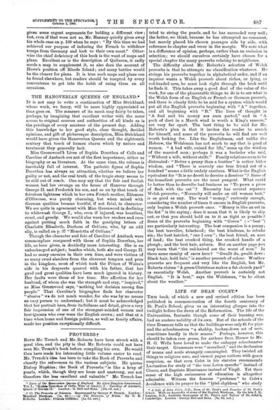A SHORT HISTORY OF THE ROYAL NAVY.* Tim unfortunate controversies
about the management of the Fleet are not perhaps an unmixed evil. They at any rate direct popular attention to naval questions, and induce a good many citizens to form some opinion for themselves on the functions of their main arm of defence. This is all to the good so long as the opinions are formed on some solid basis of historical and strategical knowledge. To all desirous of attaining such knowledge Mr. Hannay's volume on the naval history of the eighteenth century will appear very opportune. It deals with the period when our Colonial Empire was established chiefly by our naval superiority; it describes and gives reasons for our many naval failures during the same epoch, and for the luck with which we escaped still worse calamities owing to the even more serious failings of our enemies; and it tells the story of Nelson's glorious career when the Navy saved England herself from destruction. Nor is Mr. Hannay content with describing naval battles; he also gives very clear accounts of the internal economy of the Navy, of the character of our Admirals and common seamen and of their pay and mode of life, for he rightly recognises that personality is the supreme factor in all war. It is true circumstances have greatly altered since those days by the introduction of steam, by the improvement in the range of guns, and by armour-plating ; but the essential principles of success in naval, as indeed in land warfare, are just the same as before,—to seek out your enemy's main force, to destroy or blockade it, and not to potter about in trivial expeditions or timid defensive schemes which leave him free for similar, or even more dangerous, operations. As we pointed out in our review of Mr. Thursfield's book on July 24th, the essentials of naval defence are just as well illuss trated by Nelson's strategy as by the rarer engage- ments of ironclads ; and Byng's career, so admirably and elaborately described by Mr. Hannay, is as good an example to be avoided now as in the days of the Duke of Newcastle. We had, unfortunately, several officers of the Byng type during the South African War : it is to be hoped that both the Army and the Navy have learned by their failures even without the drastic " encouragement " afforded by Byng's fate.
Mr. Hannay is a somewhat unequal writer. At his best he is very good, for he has a lucid style and a power of quiet irony which are very effective when he is interested in it description. The previously quoted account of Byng, the analysis of the ideals animating the French and English Navies, the accounts of the mutinies at Spithead and the Nore, and the remarkable tour de force involved in the recon- stitution of the battle-scene at Quiberon Bay, are favourable examples of his method. But when he is less interested his style is apt to be slipshod and his descriptions uncon- vincing: Some of the errors we have noticed are probably due to careless proof-reading, but for one rather important discrepancy this excuse is hardly possible. On p. 167 he remarks that the elder Pitt's expeditions to the French coast reflect "little honour on his sagacity," and he proceeds to condemn as bad their chief reason, which was to constrain the French to withdraw troops from Germany, because such diversions were not "effectual." Mr. Corbett has recently * A Short Hiafrry of the Royal Nary, 1217-1818. By David Hannay. V91. ILe 1689-1815. London : Methuen and Co. Da. 66. net.]
given some cogent arguments for holding a different view ; but, even if that were not so, Mr. Hannay quietly gives away his whole case on p. 169 when he says : "By this time we had achieved our purpose of inducing the French to withdraw troops from Germany and look to their own coast." Other- wise the chief deficiency of this book is the want of maps and plans. Excellent as is the description of Quiberon, it sadly needs a map to supplement it, as also does the account of Howe's position off Rhode Island ; and many battles would be the clearer for plans. It is true such maps and plans can be found elsewhere, but readers should be tempted by every convenience to get into the habit of using them on all occasions.



























































 Previous page
Previous page